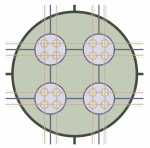UA Integrative Systems Neuroscience

- Nakanishi awarded $1.15M NSF CAREER award to study how neuropeptides control life cycle transitions in Cnidaria.
- Zabelina Lab awarded $750K from ONR to study creative thinking and problem solving over different time scales.
- Nakanishi Lab awarded $765K from NSF to study evolution of nervous systems in Cnidaria
- Matt Judah is hired in Psychology
- Josiah Leong is hired in Psychology
- Grant Shields is hired in Psychology
- Westerman Lab is awarded $800K from NSF to study the genetic and neural mechanisms of preference learning
- Shew Lab is awarded $360K from NIH to study the role of inhibition in motor cortex
- Zabelina is awarded the Rising Star award from the Association for Psychological Science (APS).
- Shew Lab together with researchers from VCU and SMU awarded $900k from NSF to study neural correlates of olfaction
- Shew and Evans collaborate to study genetic and neural basis of fly larvae locomotion.
- Lamm Lab joins the Baby’s First Years study of the impact of poverty reduction on infant and toddlers cognitive, emotional, and brain development
- Shew and Lyons work with Tesseract Center for Game Design to create video game based on neuroscience
- Apr 29, 2021 noon CST Christian Lemon, from U Oklahoma, to speak on Tasting Temperature and Pain. See a recording of the talk here.
- Apr 8, 2021 noon CST Brian Wiltgen, from UC Davis, to speak on Manipulating Memory Traces in the Hippocampus. See a recording of the talk here.
- Mar 11, 2021 noon CST Matt Judah, from Psychology, to speak on Attention in Social Anxiety Disorder and Depression. See a recording of the talk here.
- Jan 21, 2021 noon CST Grant Shields, from Psychology, to speak on Assessing neural markers of vulnerability to depression in adolescent girls. Watch a recording here.
- Dec 10, 2020 noon CST Roger Beaty, from Penn State University, to speak on Creative Cognition: Memory Systems, Cognitive Control, and Brain Dynamics. Watch a recording here.
- Nov 2020 Josiah Leong spoke on his research “Linking Brain Structure to Function to Value-Based Choice”. Watch a recording here.
- Oct 8 2020 Dr. Arianna Tamvacakis of the Nakanishi Lab, presented “The evolutionarily conserved transcription factor POU-IV is required for mechanoreceptor cell differentiation and touch-response behavior in the sea anemone Nematostella.”
- Sep 10 2020 Shannon Servoss from Chemical Engineering to speak on “Peptoids for treatment of neurological disease”
- Feb 6 2020 Michael Ceballos from Biological Sciences to speak about “Investigating the Potential Role of Human Herpesvirus-6 infection in Epileptogenesis: Moving from Correlation to Causation“
- Nov 21 2019 Douglas Kelley from University of Rochester to speak about “Essential fluid flow in the brain: new insights on the glymphatic system
- Jun 6 2019 11-11:30am SCEN 604 Arianna N. Tamvacakis from the Neuroscience Institute, Georgia State University, will give a short talk entitled “Behavioral variation correlates with differences in single neuron serotonin receptor expression within and across species”.
- May 2 2019 ENGR 307 12:30 pm RJ Elbin from Health, Human Performance and Recreation speaks on “New Empirical Findings for the Clinical Assessment, Management, and Treatment of Sport-Related Concussion.”
- Apr 12 2019 MEMH 318 1 pm Nathan Fox from U Maryland speaks on “The Effects of Early Adversity on Brain and Behavioral Development: Lessons from the Bucharest Early Intervention Project“

- Ceballos Lab – Biological Sciences – Cell and molecular biology and biochemistry of virus-host interactions impacting neuronal function.
- Evans Lab – Biological Sciences – Genetic, molecular, and cellular mechanisms that specify patterns of neuronal connectivity.
- Judah Lab – Psychological Sciences – Cognitive factors of anxiety and mood disorders.
- Kuenzel Lab – Poultry Science –Neural regulation of early sexual maturation and reproductive behavior and stress
- Lamm Lab – Psychological Sciences – Neural correlates of how development and emotion impact self-regulation EEG and fMRI.
- Leong Lab – Psychological Sciences – Structural and functional connectivity underlying emotions, perception, and choice
- Nakanishi Lab – Biological Sciences – Comparative molecular genetics and evolutionarily conserved mechanisms of how nervous systems develop and function.
- Shew Lab – Physics – Ongoing dynamics, sensory function, and motor output of large networks of neurons in cerebral cortex.
- Shields Lab – Psychological Sciences – Neural, hormonal, and immunological mechanisms of stress and cognitive processes
- Stenken Lab – Chemistry & Biochemistry – Inflammatory response in the brain using microdialysis sampling and chromatographic, immunochemical, and spectroscopic analysis methods
- Westerman Lab – Biological Sciences – Whole organism behavior, genomics, development, and neurobiology of the mechanisms driving behavioral and morphological diversity.
- Zabelina Lab – Psychological Sciences – Creative cognition and imagination, and how these processes are linked with attention and executive functions.
What is our mission?
Today’s scientific revolution is happening in neuroscience. The brain is both the greatest unsolved scientific mystery and one of the most important challenges in medicine. The U of A Integrative Systems Neuroscience group tackles this challenge by integrating across multiple different levels of study from genes to molecules, to synapses, to neurons, to networks, and finally to behavior and cognition. We combine diverse experimental techniques, computation, and theory. This integrated, systems approach is required to truly advance our knowledge of the brain. The expertise and labs that make up the Integrative Systems Neuroscience group span multiple disciplines, departments, and colleges at the University of Arkansas, Fayetteville.
How can you get involved?
Prospective students are encouraged to contact one of the labs listed above (click on their names to get more information). PhD and MS degree options are available.